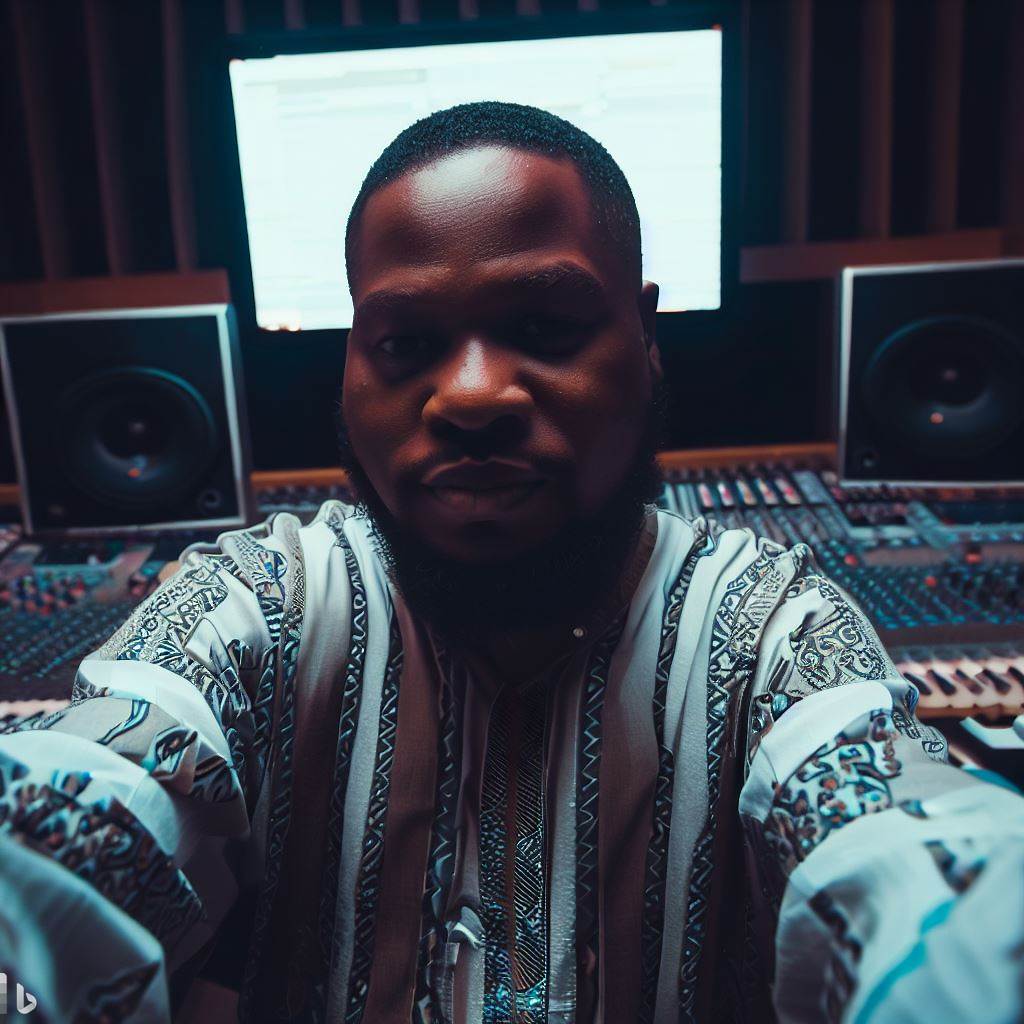Introduction
The music director profession in Nigeria plays a crucial role in the country’s music industry.This article is about the Legal Music Director Profession in Nigeria
Understanding the legal aspects related to this profession
In Nigeria, the music director profession holds significant importance in the vibrant and diverse music industry.
These professionals are responsible for guiding and shaping the creative direction of musical projects and performances.
They work closely with artists, musicians, and producers to produce high-quality music that resonates with the audience.
Understanding the legal aspects related to this profession is crucial for music directors in Nigeria.
This includes knowledge of copyright laws, contractual obligations, and intellectual property rights.
By understanding these legal aspects, music directors can protect their work, avoid potential legal disputes, and ensure fair compensation for their contributions.
Copyright laws provide music directors with the legal protection they need for their creative work.
It ensures that their music is not used without permission or proper remuneration.
By understanding these laws, music directors can ensure that their intellectual property rights are upheld and that they receive due recognition and financial benefits for their work.
Furthermore, having a clear understanding of contractual obligations is essential for music directors.
Contracts outline the agreement between the music director and other stakeholders, such as artists and producers.
Understanding these legal aspects helps music directors negotiate fair terms and conditions, ensuring that their rights and interests are protected.
he music director profession in Nigeria is an integral part of the country’s music industry.
Understanding the legal aspects related to this profession is crucial for music directors to protect their work, rights, and financial interests.
By staying informed and knowledgeable about these legal aspects, music directors can navigate their careers with confidence and contribute effectively to the flourishing Nigerian music scene.
Licensing and Registration Requirements
The need for music directors to obtain necessary licenses and registrations
In order to legally practice as a music director in Nigeria, individuals must ensure that they have obtained the necessary licenses and registrations.
This is to comply with the relevant Nigerian legislation and regulatory bodies
Music directors who wish to pursue their career in Nigeria need to be aware of the requirement to obtain the appropriate licenses and registrations.
These requirements are necessary to ensure that the music director is legally recognized and operated within the bounds of the law
Compliance with licensing and registration requirements brings various benefits to music directors in Nigeria. Firstly, it provides legal protection and recognition for their work.
This can help prevent copyright infringement and ensure that music directors receive fair compensation for their creative contributions.
Relevant Nigerian legislation and regulatory bodies
The Nigerian legislation governing the music director profession includes provisions that mandate the registration of practitioners.
This typically involves submitting the necessary documents, such as educational qualifications and proof of experience, to the appropriate regulatory bodies.
The Nigerian Copyright Commission (NCC) and the Nigerian Association of Music Directors (NAMD) regulate and license music directors.
These bodies are tasked with ensuring that music directors comply with the legal requirements in order to practice their profession.
Challenges faced by music directors in protecting their intellectual property rights
Music directors face uphill battles safeguarding their creative works, combating rampant piracy, and ensuring fair compensation.
Their innovative choreography, visual concepts, and storytelling often fall prey to unauthorized duplication and distribution.
Fighting against copyright infringement demands constant vigilance, legal action, and educational initiatives to raise awareness.
Balancing artistic expression with legal complexities remains a tightrope walk, demanding expert legal counsel and documentation.
Global reach amplifies challenges as digital platforms make unauthorized sharing effortless, impacting revenue streams significantly.
Licensing intricacies and royalty disputes add layers of complexity, compelling directors to advocate ardently for their rights.
Collaboration with musicians and production teams necessitates clear contractual agreements to prevent disputes over ownership and credits.
Innovations in technology bring hope and hurdles, requiring adaptive strategies to safeguard intellectual property in this evolving landscape.
While challenges persist, music directors persevere, uniting for systemic changes and a future where creativity is rightfully protected.
music directors in Nigeria must ensure they obtain the necessary licenses and registrations to comply with the relevant legislation and regulatory bodies.
Compliance with these requirements not only ensures legal recognition and protection but also enhances professional reputation and opens doors to various opportunities and benefits within the music industry
Copyright Law and Intellectual Property Rights
Explanation of copyright law and its application to music director profession
- Copyright law grants exclusive rights to creators of original works.
- Music directors create original compositions, arrangements, and performances.
- Copyrights protect the music director’s work from unauthorized use or reproduction.
Importance of securing copyrights for composition, arrangement, and performance
- Securing copyrights ensures legal protection for the music director’s intellectual property.
- It gives the music director the right to control and monetize their creations.
- Proper registration establishes a legal record of ownership and enables enforcement of rights.
Challenges faced by music directors in protecting their intellectual property rights
- Copyright infringement is a prevalent issue in the music industry.
- The ease of digital reproduction and distribution makes unauthorized sharing a challenge.
- Identifying and proving infringement can be difficult, delaying legal action and compensation.
- International copyright laws vary, making it complex to protect intellectual property across borders.
- Music directors often lack resources and legal expertise to fight infringement cases.
- Piracy and unauthorized use of music through streaming platforms further complicate the situation.
Copyright law plays a significant role in the music director profession.
Music directors create original works, and securing copyrights is crucial for protecting their intellectual property.
However, they face various challenges in maintaining their rights due to the prevalence of copyright infringement.
It is essential for music directors to stay informed, take preventive measures, and seek legal assistance to safeguard their creative efforts.
Read: Foley in Nigeria: Exploring the Demand in Local Film Industry
Contracts and Agreements
Types of contracts commonly used in the music director profession
- Artist Management Agreements
- Recording Contracts
- Licensing Agreements
- Performance Agreements
These contracts define the scope of work, payment terms, and duration of the engagement.
Key elements to consider when entering into contracts
- Scope of Services: Clearly define the responsibilities and expectations of the music director.
- Compensation: Agree on the fees, bonuses, and royalties the director will receive.
- Term and Termination: Specify the duration of the contract and the conditions for termination.
- Intellectual Property: Address ownership rights and usage of music compositions and recordings.
These elements ensure clarity, fairness, and protection for the music director in their professional engagements.
Overview of contractual obligations, fees, and terms
Contractual obligations refer to the duties and responsibilities that both parties must fulfill under the agreement.
Fees can include a fixed payment, performance-based payments, or a combination of both.
Terms outline the duration of the agreement, renewal options, and any non-disclosure or confidentiality clauses.
Understanding and negotiating these aspects is crucial for the music director’s career success and financial stability.
contracts and agreements play a significant role in the music director profession in Nigeria.
Various types of contracts, such as artist management agreements and recording contracts, govern the relationships between music directors and their clients.
Key elements, including scope of services, compensation, and intellectual property, must be carefully considered when entering into contracts to protect the interests of the music director.
Additionally, an overview of contractual obligations, fees, and terms provides a comprehensive understanding of the professional engagement.
By familiarizing themselves with contract negotiation and ensuring fair and transparent agreements, music directors can safeguard their rights and thrive in their chosen presentation.
Read: Essential Tools for a Foley Artist: Nigerian Perspective

Performance Rights Organisations (PROs)
Role and significance of PROs in Nigeria’s music industry
- PROs play a pivotal role in the protection and management of music directors’ performance rights.
- They ensure that music directors are paid royalties whenever their music is performed or broadcasted.
- By representing the interests of music directors, PROs serve as a collective voice for the industry.
- PROs negotiate licensing agreements with music users, such as radio stations and concert venues.
- Through monitoring and enforcement activities, PROs help combat piracy and unauthorized use of music.
Benefits of joining a PRO for music directors
- Joining a PRO grants music directors exclusive rights and access to numerous benefits.
- PROs simplify the process of licensing and collecting performance royalties on behalf of music directors.
- They provide a platform for music directors to network, collaborate, and gain exposure within the industry.
- PROs offer legal support and assistance in case of copyright infringement or disputes over performance rights.
- Being part of a PRO enhances the professional reputation and credibility of music directors.
How music directors can ensure fair compensation for their performances
- Music directors should register their works with a PRO to ensure proper protection of their performance rights.
- They must keep track of their performances and submit accurate reports of their music usage to the PRO.
- Regularly updating contact information with the PRO enables smooth communication and royalty payments.
- Music directors should actively participate in rate-setting discussions and advocate for fair compensation.
- Seeking legal advice from the PRO in case of contract negotiations can ensure fair remuneration.
In addition, PROs play a crucial role in Nigeria’s music industry by safeguarding the performance rights of music directors.
Joining a PRO offers numerous benefits, simplifies the licensing process, and provides legal support.
To ensure fair compensation, music directors need to register their works, keep track of performances, and actively engage with the PRO.
By embracing the support and services of PROs, music directors can navigate the legal landscape and maximize their earning potential in the Nigerian music industry.
Read: Salaries and Career Progression for Foley Artists in Nigeria
Taxation and Financial Considerations
Understanding tax obligations for music directors
- Music directors in Nigeria have certain tax obligations that they need to be aware of.
- They are required to pay income tax on their earnings from the profession.
- It is crucial for music directors to understand the tax laws and regulations applicable to them.
- Proper record-keeping of income and expenses is essential for accurate tax reporting.
- Music directors should consult with tax professionals to ensure compliance with tax obligations.
Strategies for managing income and expenses effectively:
- Music directors can adopt various strategies to effectively manage their income and expenses.
- They should create a budget to track their earnings and expenditure throughout the year.
- Setting aside a portion of income for taxes and savings can help in financial planning.
- Exploring tax-deductible business expenses can reduce the overall tax liability.
- Regular monitoring and adjustment of financial strategies can lead to better financial stability.
Importance of seeking professional financial advice
Seeking professional financial advice is crucial for music directors to make informed decisions.
- Financial advisors can provide guidance on tax planning and investment opportunities.
- They can help music directors optimize their income and minimize tax liabilities.
- Professional advice can assist in long-term wealth creation and financial security.
- Music directors should choose a reputable and knowledgeable financial advisor to ensure reliable support.
Music directors in Nigeria can comply with tax laws, maximize finances, and manage complexities by understanding obligations, seeking advice, and implementing strategies.
Read: Unique Soundscapes: The Role of Foley Artists in Nollywood
Dispute Resolution and Legal Recourse
Common disputes and conflicts faced by music directors
- Contractual disagreements with artists and record labels.
- Intellectual property disputes over songwriting credits and royalties.
- Breach of performance agreements and non-payment of fees.
- Copyright infringement claims regarding the unauthorized use of music.
- Conflicts with band members and disagreements over creative direction.
Music directors in Nigeria often find themselves entangled in various disputes and conflicts throughout their career.
These disputes can range from contractual disagreements with artists and record labels to conflicts arising from creative differences within a band.
The unique nature of the music industry and the subjective nature of music itself often contribute to these disputes.
One of the common disputes faced by music directors is contractual disagreements.
These can occur when there is a disagreement over the terms and conditions of a contract, such as the length of the contract, payment terms, or creative control.
For example, a music director may find themselves in conflict with a record label over the distribution and promotion of an album.
Intellectual property disputes are also common in the music industry.
These disputes can arise when there is a disagreement over songwriting credits and royalties.
Music directors may find themselves in conflicts with artists or other songwriters over the ownership and entitlement to royalties for a particular song.
This can be a complex issue, especially when multiple people claim to have contributed to the creation of a song.
Another frequent dispute faced by music directors is the breach of performance agreements and non-payment of fees.
This occurs when a music director is hired to perform at an event or concert but is not paid the agreed-upon fee.
In some cases, the event organizer may cancel the performance last-minute or refuse to pay the music director without proper justification.
Copyright infringement claims are also prevalent in the music industry.
Music directors may find themselves in legal battles over the unauthorized use of their music.
This can occur when another artist or producer uses a music director’s composition without obtaining the necessary permissions or licenses.
Such disputes can be financially damaging and may require legal intervention.
Options for resolving disputes, including mediation, arbitration, and litigation
- Mediation: A voluntary process where a neutral third party helps the parties reach a mutually acceptable resolution.
- Arbitration: Parties present their case to a neutral arbitrator who makes a binding decision.
- Litigation: Disputes are resolved through the court system, with a judge making a final determination.
When music directors find themselves embroiled in a dispute, there are various options available to resolve these conflicts.
One such option is mediation, where a neutral third party helps facilitate communication and negotiation between the disputing parties.
Mediation is a voluntary process and aims to reach a mutually acceptable resolution without the need for litigation.
This option allows music directors to retain control over the outcome of the dispute.
Arbitration is another option for resolving disputes.
In arbitration, parties present their case to a neutral arbitrator or a panel of arbitrators who make a binding decision.
Unlike mediation, the decision reached in arbitration is legally enforceable.
This option provides a more formal and structured process for resolving conflicts but may also involve higher costs and a loss of control over the outcome.
If mediation or arbitration fails to resolve the dispute, music directors may resort to litigation.
Litigation involves bringing the dispute before a court of law, where a judge decides the outcome based on the presented evidence and applicable laws.
Litigation can be a lengthy and expensive process, but it provides a final determination that is legally binding.
Overview of legal recourse available to music directors in Nigeria
In Nigeria, music directors have legal recourse to protect their rights and resolve disputes.
They can seek legal assistance from lawyers with expertise in entertainment and intellectual property law.
Publish Your Professional Profile, Business or Brand
Showcase your expertise, gain trust, and boost visibility instantly on Professions.ng.
Publish NowThese lawyers can guide music directors through the legal process, represent them in negotiations, and, if necessary, initiate legal proceedings.
When faced with contractual disagreements or breaches, music directors can file lawsuits to enforce the terms of the contract or seek compensation for damages.
This legal recourse allows them to protect their financial interests and hold the breaching party accountable.
In cases of copyright infringement, music directors can file lawsuits to seek injunctions against the unauthorized use of their music and claim damages for any financial losses suffered.
Nigerian copyright law provides protection for original musical works, and music directors can rely on these laws to safeguard their intellectual property rights.
Mediation and arbitration processes can also be pursued in Nigeria to resolve disputes outside of the courts.
These alternative dispute resolution methods offer a faster and more cost-effective means of reaching a resolution.
Many music directors find these options preferable, as they provide a more collaborative environment and allow for more creative solutions.
Overall, Nigerian music directors have access to various legal recourse options to address disputes and conflicts within their profession.
Whether through mediation, arbitration, or litigation, these avenues ensure that their rights are protected, and their voices are heard in matters of legal significance.
Conclusion
Recap of the importance of understanding legal aspects in the music director profession.
Understanding the legal aspects of the music director profession in Nigeria is crucial for success. Violation of copyright laws or breach of contract can have serious consequences.
It is important for music directors to seek legal advice to navigate the complexities of the industry.
Encouragement to seek legal advice and stay informed about relevant laws and regulations.
Staying informed about relevant laws and regulations is essential.
Music directors must keep up with changes in copyright laws, licensing requirements, and other legal aspects that affect their profession.
This knowledge not only protects their rights but also enhances their professional reputation.
Final thoughts on the future of the music director profession in Nigeria.
The future of the music director profession in Nigeria looks promising. The industry is growing, and more opportunities are opening up.
However, with the rise of digital platforms and globalization, it is imperative for music directors to adapt to legal changes and protect their intellectual property.
By staying proactive and seeking legal advice, music directors can ensure a successful and sustainable career in Nigeria’s vibrant music industry.




